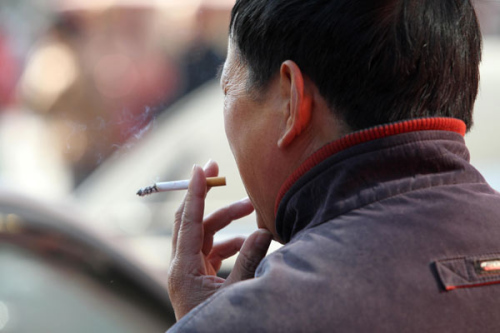
A man takes a cigarette break in a public place in Nantong, Jiangsu province, on Nov 30, 2013. (Provided to China Daily)
Over the last 10 years, impressive gains have been made in the battle against the tobacco epidemic. Spurred by the World Health Organization Framework Convention on Tobacco Control, which came into force in 2005, most countries have launched comprehensive tobacco-control programs. But much more remains to be done. If the tobacco epidemic is not addressed, it will, according to WHO estimates, kill 1 billion people over the course of this century.
Tobacco use has the potential to undermine economic and social development worldwide. In order to offset this, the WHO has identified six policies - encapsulated in the acronym MPOWER - that can stamp out the tobacco epidemic: Monitor tobacco use and prevention policies; protect people from tobacco smoke; offer help to quit tobacco use; warn people about the dangers of tobacco; enforce bans on tobacco advertising, promotion, and sponsorship; and raise taxes on tobacco.
According to the latest WHO Report on the Global Tobacco Epidemic, levying taxes on tobacco is one of the cheapest and most effective measures to prevent death and suffering. Unfortunately, it is a tool that few countries are using.
The evidence of progress detailed in the WHO's report is impressive. The report makes a strong case for the implementation of MPOWER, showing how effective robust interventions can be. Decisive action in many countries has ensured that almost half the world population is covered by at least one MPOWER measure applied at the highest level. Since 2007, the number of countries implementing some form of the recommendations has more than doubled - and millions of lives have been saved.
The report also details the efforts countries are making to meet tobacco-control targets and makes recommendations for improvement. In many cases, it suggests raising taxes on tobacco. Despite the strategy's proven effectiveness, it is the least implemented MPOWER measure. According to a WHO report, only 33 countries levy sufficiently high taxes on tobacco, amounting to at least 75 percent of the retail price of cigarettes. This means that only one in 10 people worldwide benefits from this measure.
Taxes on tobacco cost little to implement and lead to a windfall of benefits. They make tobacco products less affordable, helping addicts quit and preventing non-users - especially young people, women and the poor - from ever starting. The levies also provide countries with additional revenue that can be used to fund vital health programs and other essential public services. Indeed, tobacco taxation is an untapped source of domestic financing that will be important for the successful implementation of the post-2015 Sustainable Development Goals.
Every country has the obligation - and the ability - to protect its people's well-being. Governments have made tremendous progress in the fight against the tobacco epidemic by implementing multiple MPOWER measures, but many could be doing much more if they were willing to raise taxes on tobacco.
Our organizations, the WHO and the World Bank Group, believe that it is a moral and economic imperative to support every possible measure of tobacco control. Taxes on tobacco - the least expensive, least implemented and most effective tool in the fight to reduce the use of this deadly product - should not be left unimplemented. By raising the cost of tobacco, we have the potential to reverse the epidemic, prevent widespread illness and suffering and save millions of lives every year.
The authors: Oleg Chestnov is WHO assistant director-general for Noncommunicable Diseases and Mental Health, and Tim Evans is senior director for Health, Nutrition and Population Global Practice at the World Bank Group.


















































